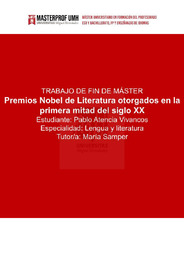Por favor, use este identificador para citar o enlazar este ítem:
https://hdl.handle.net/11000/35575Registro completo de metadatos
| Campo DC | Valor | Lengua/Idioma |
|---|---|---|
| dc.contributor.advisor | Samper, María | - |
| dc.contributor.author | Atencia Vivancos, Pablo | - |
| dc.contributor.other | Departamentos de la UMH::Ciencias Sociales y Humanas | es_ES |
| dc.date.accessioned | 2025-02-05T12:31:56Z | - |
| dc.date.available | 2025-02-05T12:31:56Z | - |
| dc.date.created | 2024-09 | - |
| dc.identifier.uri | https://hdl.handle.net/11000/35575 | - |
| dc.description | Especialidad: Lengua y Literatura | es_ES |
| dc.description.abstract | Este trabajo de fin de máster presenta una revisión sistemática de los autores galardonados con el Premio Nobel de Literatura durante la primera mitad del siglo XX. A lo largo del estudio, se examinan las contribuciones literarias, el contexto histórico y cultural de cada laureado, y el impacto que sus obras han tenido en el canon literario global. Además, se considera la relevancia pedagógica de estos autores y sus obras en la enseñanza de la literatura, destacando cómo su estudio puede enriquecer el currículo y fomentar un enfoque inclusivo y crítico en la educación literaria. El análisis se organiza de manera cronológica para identificar patrones temáticos, estilísticos y de recepción crítica que han caracterizado la selección de los laureados. A través de esta estructura, el estudio ofrece una visión coherente y comprensiva del desarrollo de la literatura moderna, subrayando la diversidad y la innovación que han definido este periodo. Finalmente, el trabajo reflexiona sobre las implicaciones pedagógicas de los hallazgos y sugiere posibles líneas de investigación futura, destacando la importancia de continuar explorando la literatura desde una perspectiva global y crítica en el contexto educativo. | es_ES |
| dc.description.abstract | This master's thesis presents a comprehensive literature review of the authors awarded the Nobel Prize for Literature during the first half of the twentieth century. Throughout the study, we examine the literary contributions, the historical and cultural context of each laureate, and the impact their works have had on the global literary canon. In addition, the pedagogical relevance of these authors and their works to the teaching of literature is considered, highlighting how their study can enrich the curriculum and foster an inclusive and critical approach to literary education. The analysis is organized chronologically, addressing each decade of the twentieth century to identify thematic, stylistic, and critical reception patterns that have characterized the selection of the Laureates. Through this structure, the study offers a coherent and comprehensive view of the development of modern literature, highlighting the diversity and innovation that have defined this period. Finally, the paper reflects on the pedagogical implications of the findings and suggests possible lines of future research, highlighting the importance of continuing to explore literature from a global and critical perspective in the educational context. | es_ES |
| dc.format | application/pdf | es_ES |
| dc.format.extent | 22 | es_ES |
| dc.language.iso | spa | es_ES |
| dc.publisher | Universidad Miguel Hernández de Elche | es_ES |
| dc.rights | info:eu-repo/semantics/openAccess | es_ES |
| dc.rights | Attribution-NonCommercial-NoDerivatives 4.0 Internacional | * |
| dc.rights.uri | http://creativecommons.org/licenses/by-nc-nd/4.0/ | * |
| dc.subject | Premio Nobel de Literatura | es_ES |
| dc.subject | Innovación literaria | es_ES |
| dc.subject | Canon literario | es_ES |
| dc.subject | Diversidad cultural | es_ES |
| dc.title | Premios Nobel de literatura otorgados en la primera mitad del siglo XX | es_ES |
| dc.type | info:eu-repo/semantics/masterThesis | es_ES |

Ver/Abrir:
TFM ATENCIA VIVANCOS, PABLO_compressed.pdf
280,83 kB
Adobe PDF
Compartir:
 La licencia se describe como: Atribución-NonComercial-NoDerivada 4.0 Internacional.
La licencia se describe como: Atribución-NonComercial-NoDerivada 4.0 Internacional.
.png)